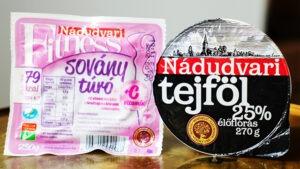Tradition and innovation: this is how Nádudvari stays competitive in the food market
In today’s food market, it is not enough to simply offer good quality – manufacturers have to meet more and more and often contradictory expectations. The rise of conscious nutrition, the emphasis on sustainability and the enhancement of the customer experience are all challenges that domestic brands have to face on a daily basis. The 100% Hungarian-owned Nádudvari Élelmiszer Kft. treats this challenge not as a constraint, but as an opportunity – reveals the interview given by Managing Director Ádám Nagy to Agrárszektor.hu.
 The backbone of the company’s strategy is reliability, quality domestic ingredients and a commitment to traditional flavors. Their goal is to offer products that simultaneously evoke homely, familiar flavors and meet the expectations of modern consumers. This applies to dairy products, meat products and convenience products – including mirelit – as well. According to the CEO, however, these are not compromise solutions: Nádudvari aims to provide a real alternative, without compromise.
The backbone of the company’s strategy is reliability, quality domestic ingredients and a commitment to traditional flavors. Their goal is to offer products that simultaneously evoke homely, familiar flavors and meet the expectations of modern consumers. This applies to dairy products, meat products and convenience products – including mirelit – as well. According to the CEO, however, these are not compromise solutions: Nádudvari aims to provide a real alternative, without compromise.
Animal epidemics of recent years – such as foot-and-mouth disease – have not directly affected the company’s operations, thanks to the fact that most of their suppliers deliver from within 50 kilometers. In addition to mitigating logistical risks, the company applies strict hygiene protocols: disinfecting vehicles serving the dairy and adhering to the internal rules of the plants are a basic principle.
Nádudvari was among the first to respond to growing consumer demands by developing additive-free, lactose- and gluten-free, and vegan products. The company has been offering E-free curds, butter and cheese spreads for more than ten years. According to the CEO, the biggest challenge is finding spices that are truly free of additives, yet still retain the desired flavor. The goal in all cases is that the products not only meet expectations, but also provide an experience.
Innovation does not stop at recipes. In the mirelit segment – for example, fried vegetables, cheeses – in addition to speed, practicality and health awareness are also key considerations. The products are developed so that they can be easily prepared in the oven or airfryer, including vegetarian and vegan versions. The goal here is clear: convenience products should also be complete meals.
Environmental protection is also increasingly emphasized in the company’s operations. In addition to reducing the plastic content of packaging, recycled materials have also been introduced; fruit yogurts, for example, are placed on the shelves in paper-rimmed cups. Sustainability efforts also include energy modernization: in 2023, the company launched a comprehensive development program, thanks to which the solar capacity of the dairy and meat plant was expanded from 50 kW to 200 kW. In addition, heat recovery systems were installed that use heat loss during production to produce hot water.
Related news
ESG: the majority don’t ask for postponement, preparedness level is increasing
🎧 Hallgasd a cikket: Lejátszás Szünet Folytatás Leállítás Nyelv: Auto…
Read more >Related news
(HU) METRO Gasztro Fesztivál a SIRHA Budapesten – Élmény, inspiráció és valódi megoldások a HoReCa-szakmának
🎧 Hallgasd a cikket: Lejátszás Szünet Folytatás Leállítás Nyelv: Auto…
Read more >








